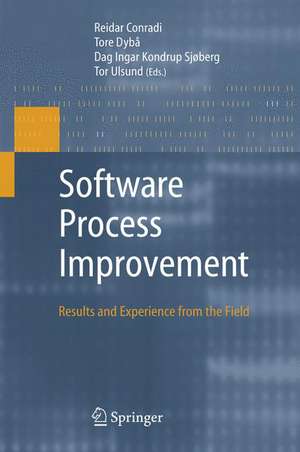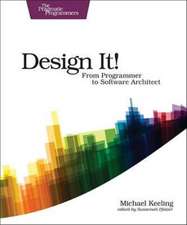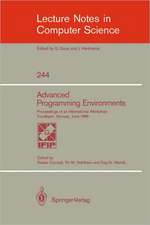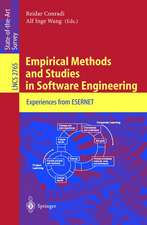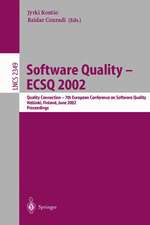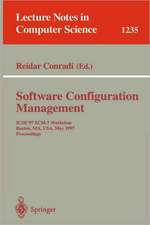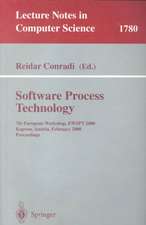Software Process Improvement: Results and Experience from the Field
Editat de Reidar Conradi, Tore Dybå, Dag I.K. Sjøberg, Tor Ulsunden Limba Engleză Hardback – mar 2006
Conradi and his co-authors have collected the main results from four Norwegian industrial research and development projects on SPI carried out between 1996 and 2005, which, in contrast to other treatments, concentrated on small- and medium-sized companies, typically characterized by fast-changing environments and processes. The presentation is organized in five sections: general principles and methods of SPI, knowledge management for SPI, process modelling and electronic process guides, estimation methods, and object-oriented and component-based systems. A spectrum of empirical methods has been used, e.g. case studies, large-scale experiments, surveys and interviews, and action research.
The book mainly targets researchers and graduate students in (empirical) software engineering, and software professionals working in development or quality assurance.
| Toate formatele și edițiile | Preț | Express |
|---|---|---|
| Paperback (1) | 987.78 lei 6-8 săpt. | |
| Springer Berlin, Heidelberg – 14 oct 2010 | 987.78 lei 6-8 săpt. | |
| Hardback (1) | 999.85 lei 6-8 săpt. | |
| Springer Berlin, Heidelberg – mar 2006 | 999.85 lei 6-8 săpt. |
Preț: 999.85 lei
Preț vechi: 1249.82 lei
-20% Nou
Puncte Express: 1500
Preț estimativ în valută:
191.38€ • 207.95$ • 160.86£
191.38€ • 207.95$ • 160.86£
Carte tipărită la comandă
Livrare economică 21 aprilie-05 mai
Preluare comenzi: 021 569.72.76
Specificații
ISBN-13: 9783540321781
ISBN-10: 3540321780
Pagini: 428
Ilustrații: XII, 414 p. 42 illus.
Dimensiuni: 155 x 235 x 25 mm
Greutate: 0.77 kg
Ediția:2006
Editura: Springer Berlin, Heidelberg
Colecția Springer
Locul publicării:Berlin, Heidelberg, Germany
ISBN-10: 3540321780
Pagini: 428
Ilustrații: XII, 414 p. 42 illus.
Dimensiuni: 155 x 235 x 25 mm
Greutate: 0.77 kg
Ediția:2006
Editura: Springer Berlin, Heidelberg
Colecția Springer
Locul publicării:Berlin, Heidelberg, Germany
Public țintă
Academic/professional/technical: Research and professionalCuprins
Software Process Improvement – General Principles and Methods.- Lessons Learned and Recommendations from Two Large Norwegian SPI Programmes.- Improvisation in Small Software Organizations.- An Empirical Investigation of the Key Factors for Success in Software Process Improvement.- Evidence-Based Software Engineering for Practitioners.- Challenges and Recommendations when Increasing the Realism of Controlled Software Engineering Experiments.- Knowledge Management for SPI.- Postmortem Reviews: Purpose and Approaches in Software Engineering.- Value-Based Knowledge Management – the Contribution of Postmortem Reviews and Process Workshops.- A Dynamic Model of Software Engineering Knowledge Creation.- An Empirical Study of an Informal Knowledge Repository in a Medium-Sized Software Consulting Company.- An Empirical Study on the Utility of Formal Routines to Transfer Knowledge and Experience.- Process Modelling and Electronic Process Guides.- Tailoring RUP to a Defined Project Type: A Case Study.- A Workshop-Oriented Approach for Defining Electronic Process Guides – A Case Study.- Empirical Investigation on Factors Affecting Software Developer Acceptance and Utilization of Electronic Process Guides.- Six Theses on Software Process Research.- Estimation Methods.- A Review of Studies on Expert Estimation of Software Development Effort.- Reuse of Software Development Experiences – A Case Study.- Effort Estimation of Use Cases for Incremental Large-Scale Software Development.- Empirical Studies in OO and Component-based Systems.- Experiences from Introducing UML-based Development in a Large Safety-Critical Project.- An Empirical Study on Off-the-Shelf Component Usage in Industrial Projects.- Evaluating the Effect of a Delegated versus Centralized Control Style on theMaintainability of Object-Oriented Software.
Recenzii
From the reviews:
"The continuous improvement of software processes has been a managerial focus for several decades. This book, written by Norwegian academics, ‘mainly targets researchers and graduate students in empirical software engineering.’ … The papers are varied and well written … . Academics in both information technology and software engineering will find a basis for further research projects in this title." (David Bellin, Computing Reviews, December, 2006)
"The continuous improvement of software processes has been a managerial focus for several decades. This book, written by Norwegian academics, ‘mainly targets researchers and graduate students in empirical software engineering.’ … The papers are varied and well written … . Academics in both information technology and software engineering will find a basis for further research projects in this title." (David Bellin, Computing Reviews, December, 2006)
Notă biografică
Reidar Conradi received his Ph.D. in computer science from the Norwegian University of Science and Technology (NTNU) in 1976. From 1972 to 1975 he worked at SINTEF as a researcher. Since 1975 he has been assistant professor at NTNU and a full professor since 1985. He has participated in many national and EU projects and chaired several workshops. His research interests are in software engineering, object-oriented methods and software reuse, distributed systems, software evolution and configuration management, software quality and software process improvement.
Tore Dybå is the chief scientist at SINTEF Information and Communication Technology and a visiting scientist at the Simula Research Laboratory. His research interests include empirical software engineering, software process improvement, and organizational learning. He received his Dr. Ing. in computer and information science from the Norwegian University of Science and Technology. He’s a member of the International Software Engineering Research Network and the IEEE Computer Society. Dag Sjøberg received the MSc degree in computer science from the University of Oslo in 1987 and the PhD degree in computing science from the University of Glasgow in 1993. He has five years of industry experience as a consultant and group leader. He is now research director of the Department of Software Engineering, Simula Research Laboratory, and a professor of software engineering in the Department of Informatics, University of Oslo. Among his research interests are research methods in empirical software engineering, software process improvement, software effort estimation, and object-oriented analysis and design.
Tor Ulsund is quality manager at Geomatikk AS, a company providing systems for asset management. He has been working as systems developer, quality manager and project manager from 1980. From 1997 he has been project manager for the three large Norwegian processimprovement projects SPIQ, PROFIT and SPIKE.
Tore Dybå is the chief scientist at SINTEF Information and Communication Technology and a visiting scientist at the Simula Research Laboratory. His research interests include empirical software engineering, software process improvement, and organizational learning. He received his Dr. Ing. in computer and information science from the Norwegian University of Science and Technology. He’s a member of the International Software Engineering Research Network and the IEEE Computer Society. Dag Sjøberg received the MSc degree in computer science from the University of Oslo in 1987 and the PhD degree in computing science from the University of Glasgow in 1993. He has five years of industry experience as a consultant and group leader. He is now research director of the Department of Software Engineering, Simula Research Laboratory, and a professor of software engineering in the Department of Informatics, University of Oslo. Among his research interests are research methods in empirical software engineering, software process improvement, software effort estimation, and object-oriented analysis and design.
Tor Ulsund is quality manager at Geomatikk AS, a company providing systems for asset management. He has been working as systems developer, quality manager and project manager from 1980. From 1997 he has been project manager for the three large Norwegian processimprovement projects SPIQ, PROFIT and SPIKE.
Caracteristici
Includes supplementary material: sn.pub/extras
